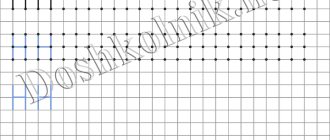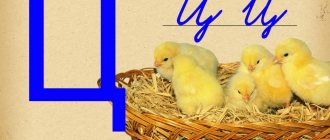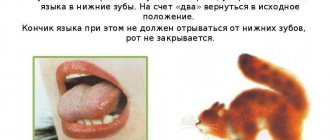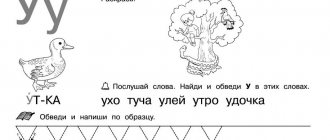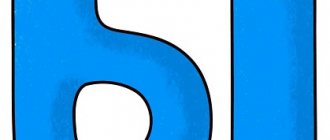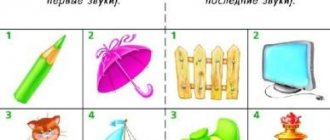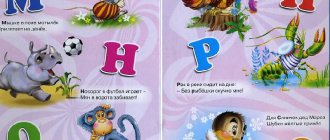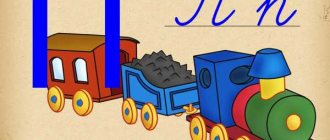The letter M (em) is found in all Slavic Cyrillic alphabets. Even non-Slavic peoples have this letter in their writing.
We can say that this is a universal letter, because it is found in almost all languages of the world.
The Old Slavonic and Church Slavonic alphabets gave the name of the letter “myslEte” with the emphasis on the penultimate syllable, E. The letter had the meaning “think”, which is quite logical, judging by the name it had.
Articulation and pronunciation of M
If we pronounce a word that contains such a sound, for example: ball, Masha, we will feel that the lips are slightly compressed, the tongue inside the oral cavity is moved back a little and even slightly pulled up to the upper palate with its middle part.
Then we feel the air begin to come out through the nose. A voice is heard, i.e. the sound is loud.
He doesn't have a partner, i.e. there is no sound similar to [m], but dull.
It can be pronounced firmly or softly. It depends on the letters next to the M.
Carrot - ball (hard - soft).
Remember: The letter M stands for the consonant sound [m]. It can be hard or soft, but it is always a labial nasal sonorant sound. The sound is softened by vowels - e, e, i, i and a soft sign: mint, chalk, bear, eight and others.
The sounds [m], [m' - m] normally appear in a child between the ages of 0 and 1 year.
If a child at 1 year old does not have the sounds [m], [m'], be sure to contact a speech therapist who works with young children.
How to pronounce the sound [m].
- nasal sound;
- the soft palate is lowered (does not close), part of the air passes through the nose;
- the tongue is passive (flat): the tip of the tongue lies on the bottom of the oral cavity;
- lips are closed and open sharply when pronouncing;
- teeth are open;
- vocal folds are closed;
- the air stream is sounded.
- Articulatory features of sound [ m ] .
[m] – nasal sound. The soft palate is lowered, part of the air passes through the nose;
[m] – consonant sound. The air escaping from the oral cavity meets a barrier, closed lips;
[m] – ringing sound. When pronouncing the sound [m], the vocal cords are closed, vibrate, and a voice is formed;
[m] – stop-pass sound according to the method of formation. The bow is formed by the lips, but the air stream goes through the nose;
[m] – labial-labial sound at the place of formation. A barrier to the air stream is formed by the lower and upper lips.
- Acoustic signs of sound [ m ] .
[m] – sonorant (sonorous) sound. Noise is involved to a minimal extent;
[m] - hard sound - the middle part of the back of the tongue does not take an active part.
- Sound disturbances [ m ] .
The pronunciation of the sound [m] is extremely rarely violated:
- the absence of sound [m] can be due to impaired nasal breathing (adenoids), with pronounced defects of the lips, with a weak orbicularis oris muscle;
— replacement of sound [m];
— sound mixing [m].
How to pronounce the sound [m'].
- nasal sound;
- the lips are pressed more closely to the teeth, the corners are slightly moved apart;
- the tongue moves forward and the middle part of the tongue rises;
- The soft palate is lowered and some air passes through the nose.
1). Articulatory features of the sound [m'].
[m'] – nasal sound. The soft palate is lowered, part of the air passes through the nose;
[m'] – consonant sound. The air escaping from the oral cavity meets a barrier, closed lips;
[m'] – voiced sound. When pronouncing the sound [m], the vocal cords are closed, vibrate, and a voice is formed;
[m'] – stop sound according to the method of formation. The bow is formed by the lips, but the air stream goes through the nose;
[m'] – labial-labial sound at the place of formation. A barrier to the air stream is formed by the lower and upper lips.
2). Acoustic signs of sound [m ’].
[m'] – sonorant (sonorous) sound. Noise is involved to a minimal extent;
[m'] – soft sound. The middle part of the back of the tongue rises towards the hard palate.
3). Sound disturbances [m'].
The pronunciation of the sound [m'] is extremely rarely violated:
- the absence of sound [m'] can be due to impaired nasal breathing (adenoids), with pronounced defects of the lips, with a weak orbicularis oris muscle;
— replacement of sound [m'];
- sound mixing [m'].
Letter M style
The letter is very easy to write both in written and printed form.
If you print it, then just put two sticks and a tick between them - and you get the letter M.
Many good words begin with the letter M:
- mother is the closest person to everyone;
- Moscow is the capital of a country where people live whose native language is Russian;
- the baby is his mother’s very sweet little man;
- possible - a word that allows you to do pleasant things;
- ice cream is the most delicious treat for children and adults and many, many more wonderful words.
Distinctive features of soft and hard sounds
What sound comes after a consonant:
- If after a consonant there is a vowel a, o, u, e, s, then the consonant is hard.
- If after a consonant there is a vowel and, e, yu, i, then the consonant is soft.
Practice with examples: In the words “mother” and “nora” the consonants are hard, because they are followed by “a” and “o”. In the words “fly” and “nanny” the consonants are soft because they are followed by “e”, “i”, “ya”.
- If another consonant sounds after a consonant, then the first consonant will be hard.
- There are sounds that can only be hard and sounds that can only be soft, no matter what sound is heard or what letter is written after them.
Always hard sounds - zh, sh, ts. Always soft - th, h, shch. A common way to learn these sounds is a simple technique: we write the letters that convey these sounds on a line, and emphasize “th, ch, sch.” The underscore symbolizes the cushion on which the soft sounds sit. The pad is soft, which means the sounds are soft.
Soft sign and hard sign
- If there is a consonant at the end of a word and the letter “b” after it, then the consonant is soft.
This rule is easy to apply if the child sees the written word, but it will not help if the child performs the task by ear.
Movement of the tongue when pronouncing soft and hard sounds
When pronouncing a soft sound, the tongue moves slightly forward, approaching (or touching) the palate with its middle. When pronouncing hard sounds, the tongue does not move forward.
Test "Letter M"
In order to develop phonemic awareness, it will be useful to listen to words containing M at the beginning, middle and end of the word. I prepared a small test for this case.
Ask your parents to read each word out loud to you and try to determine where M is pronounced firmly, where softly, and determine the place of the sound M in the word: beginning, middle, end.
Collocations (90)
- small homeland
- small man
- little of
- errand boy
- Sissy
- megalomania
- manna from heaven
- Mass culture
- handyman
- master of his craft
- material well-being
- material goods
- material values
- mother's love
- bearish angle
- disservice
- between two fires
- between this and then
- between a rock and a hard place
- between us
- between heaven and earth
- between them
- by the way
- between themselves
- between Scylla and Charybdis
- meanwhile
- interpersonal relationships
- Sales Manager
- My name is
- measures of influence
- local
- scene
- location
- habitat
- a place under the sun
- place of residence
- place of work
- Place of Birth
- dear to my heart
- minor mood
- global community
- Milky Way
- I think
- I'm really sorry
- a lot others
- a lot of time
- many people
- a lot of work
- many times
- much more
- mobile app
- mobile phone
- can be
- my regards
- May be
- may cause
- can be
- it would be possible
- can be distinguished
- you can speak
- can be seen
- you can note
- can be attributed
- one can assume
- can be done
- one can conclude
- one might say
- it could be considered
- it can be argued
- brainstorm
- younger generation
- young man
- young people
- wet behind the ears
- reckless
- frost on the skin
- manhood
- male genital organ
- male member
- musical composition
- musical instrument
- pangs of conscience
- municipality
- goosebumps
- goosebumps crawl on the skin
- wouldn't hurt a fly
- we see
- we are glad
- we believe
- to put it mildly
On this page you can find the most popular words starting with "m" (at the beginning of the word - M). The list is sorted alphabetically. You can add your options in the comments. If you click on a word, its synonyms and meanings will open.
See also: words containing M.
Open page 2 of words on m →
- The search took 0.008 seconds. Remember how often you look for something to replace a word with? Bookmark sinonim.org to quickly search for synonyms, antonyms, associations and sentences (press Ctrl+D).
Tale about the letter M
The mouse Mouse and the bear cub Misha were lying in the clearing and eating raspberries. The mouse says: “Let’s come up with poems.” Listen to what I wrote:
Every day and every hour we stubbornly repeat: There is no one in the world better than ours...
- Raspberries! - Misha yelled. - What does “raspberry” have to do with it! I wanted to say: “Better than our mother.” - That's great too! And now I’ll write... What about? - Well, at least about this fly agaric.
Don't eat white pasta, but eat red fly agarics!
- What are you, what are you! - The mouse was scared. “You can’t eat fly agarics, you’ll end up in the hospital.” Here, listen to the verse about the doctor:
There is no more important doctor in the forest than the lively redhead...
- Aibolit! - the bear cub yelled. - Yes, not Aibolit, but an ant. Aibolit heals animals, and the ant heals the forest. - How do you know so much? - He who reads a lot knows a lot! - the mouse Mouse answered importantly...
(G. Yudin)
Continue the sentence
He slept all winter in a fur coat, sucked his brown paw, and when he woke up, he began to roar. This is a forest animal... (bear).
Look at the fellows: Cheerful and lively. Dragging from all ends Material for construction. One suddenly stumbled and a friend rushes to the rescue. The people here are good. Without work, for the life of me. Can’t live... (ant).
Lyudmila went to wash her hands. She needed... (soap).
Everyone here in the forest is talented - both a singer and... (musician).
Our Tanya is crying loudly. Dropped it into the river... (ball).
The distance of the fields turns green, the nightingale sings. The garden is dressed in white, The bees are the first to fly. Thunder rumbles. Guess what month this is? … (May.)
We put the puppy in water and soap for two hours with a washcloth... (washed).
Under a heavy burden - Underground, in a closet. She lives in a hole. Gray baby. Who is this? ... (mouse.)
In a black field, a white hare jumped, ran, and made loops. The trail behind him was also white. Who is this hare? … (chalk.)
Assignment: Printed letter M for preschoolers
- Look at the letter M. What does it look like?
- Form the letter M with your fingers.
- Write the letter M in the air.
Draw the sticks carefully along the cells with a simple pencil or ballpoint pen.
In cases where the child is asked to write a whole line of a letter, syllable or word, the adult gives a writing sample at the beginning of the line. If a preschooler has difficulties, then an adult can draw two approximate lines, or put reference points that the child will connect with lines, or write the entire letters, and the child will simply circle them in a different color. Calligraphy should not be required at this stage of training.
Print
Riddles for children starting with the letter M
The giant stands in the port, illuminating the darkness, and signals to the ships: “Come and visit us!” (Lighthouse)
Above the river, across. The giant lay down stretched out. Across the river, along the back. He allowed me to walk. (Bridge)
The owner of the forest wakes up in the spring, And in winter, to the howl of a blizzard, He sleeps in a snowy hut. (Bear)
In the forest near the stump there is running and bustling: The working people are busy all day, building a house for themselves. (Ants)
The red nose has grown into the ground, and the green tail is outside. We don't need a green tail, we only need a red nose. (Carrot)
He flies all day long, bores everyone; The night will come. Then it will stop. (Fly)
Crowded, noisy, young, the city rumbles underground. And there are houses with people running along the street. (Metro)
It slips away like something alive, But I won’t let it go. It foams with white foam, I’m not too lazy to wash my hands. (Soap)
What kind of artist applied leaves, grass, and thickets of roses to the glass? (Freezing)
Small stature, long tail, gray coat, sharp teeth. (Mouse)
A red-hot arrow felled an oak tree near the village. (Lightning)
Liquid, not water. White, not snow. (Milk)
The white pebble melted and left marks on the board. (Chalk)
Horned, but not butting. (Month)
